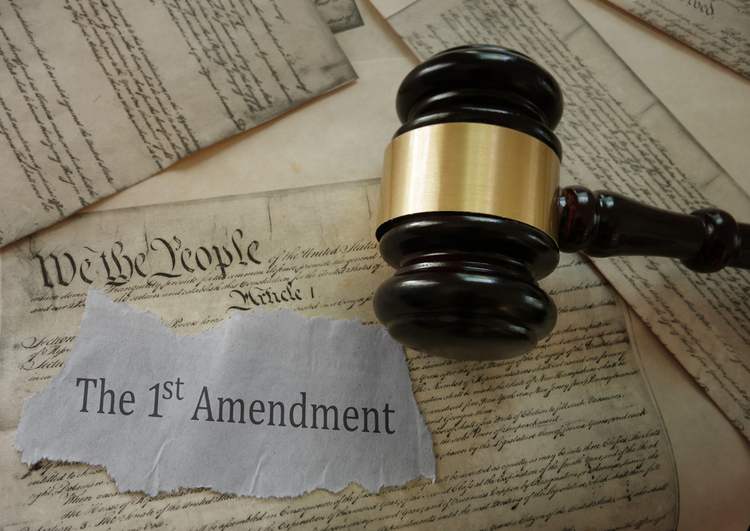ACLU is split by internal debate over First Amendment support for hate speech

Image from Shutterstock.
The American Civil Liberties Union, long known for its support of the First Amendment, is dealing with internal dissension over defense of hate speech.
The ACLU has defended the free speech rights of conscientious objectors, labor organizations, civil rights activists, the Nation of Islam, the Ku Klux Klan and Nazis. But that hard-line free speech stance is coming under fire.
On the one side are those who say the First Amendment is used as a tool of the powerful, and the ACLU should not defend free speech rights of the far right, the New York Times reports. On the other side are those who say the ACLU’s role is to defend speech—no matter how offensive.
The New York Times noted that the ACLU’s budget nearly tripled to more than $300 million after the 2016 election of former President Donald Trump. But the group still has only four free speech lawyers on staff—the same number that it employed a decade ago.
New staff members hired as money flowed in “worked inside their policy silos,” the New York Times said, “focused on issues like immigration, transgender rights and racial justice.”
The ACLU adopted new guidelines in free speech cases after its Virginia organization defended the right of far-right groups to march in Charlottesville, Virginia, in August 2017. The Unite the Right rally turned violent, and a neo-Nazi who plowed his car into a crowd of racism protesters killed a paralegal.
The new guidelines suggest that lawyers considering free speech representation of groups whose values “are contrary to our values” should weigh how such a case could give offense to marginalized groups.
Anthony Romero, executive director of the ACLU, told the New York Times that the ACLU still backs First Amendment principles. The group has argued that drivers should be allowed to display a Confederate flag on specialty license plates, and it has criticized Facebook and Twitter for banning Trump from their sites.
But some of the group’s stances surprised longtime supporters, the New York Times reports. When then-Judge Brett M. Kavanaugh was nominated to be a U.S. Supreme Court justice, the ACLU broadcast an ad strongly suggesting that Kavanaugh was guilty of sexual assault. Critics saw the stance as partisan activity by a group that submits amicus briefs to the Supreme Court, according to the New York Times.
One transgender ACLU lawyer supported stopping circulation of a book suggesting that the number of teenage girls identifying as transgender was part of a “craze.” Another staff member complained that Title IX proposals on handling of campus sexual assault investigations favored the accused, surprising those who support due process protections.
Romero isn’t bothered by the contradictions.
“I’m asked, ‘Are we a free speech or racial justice organization?’ And I answer, ‘Yes.’ We are a domestic human rights organization,” Romero told the New York Times.



